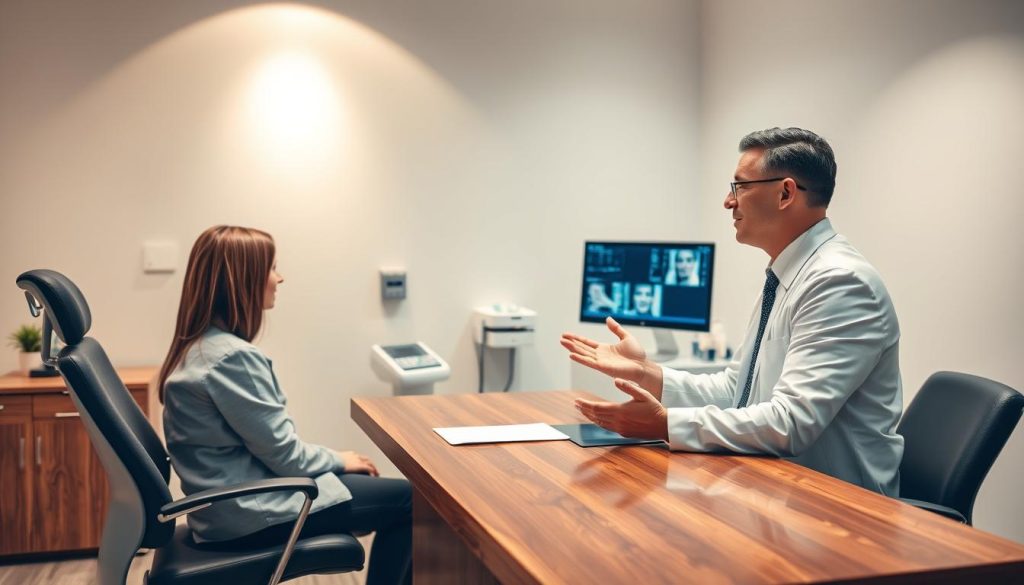A successful consultation with a board-certified cosmetic surgeon is crucial in educating patients about their options and alleviating concerns before scheduling a procedure.
Being prepared for the consultation is key to getting the most out of this initial meeting. It’s an opportunity for patients to learn about the procedure, discuss their concerns, and establish realistic expectations with their surgeon.
A thorough consultation helps the surgeon understand the patient’s medical history, physical characteristics, and desired outcomes to develop a customized treatment plan.
Key Takeaways
- Understand the importance of a plastic surgery consultation in achieving a successful surgical experience.
- Prepare for the consultation by gathering information and asking the right questions.
- Establish realistic expectations with your surgeon during the initial meeting.
- Learn about the procedure and recovery process to make informed decisions.
- Develop a customized treatment plan with your surgeon.
Preparing for Your Plastic Surgery Consult

Preparing for a plastic surgery consultation is a crucial step towards achieving your desired outcome. To ensure a productive and informative discussion with your plastic surgeon, it’s essential to be well-prepared.
Research Before Your Appointment
Thorough research before your plastic surgery consult helps you understand procedure options, potential outcomes, and important questions to ask your surgeon about their board certification and experience. Researching your procedure ahead of time enables you to make informed decisions.
Important Documents to Bring
Creating a comprehensive list of your complete medical history, including previous surgeries, medications, allergies, and family medical conditions, ensures your plastic surgeon can properly assess your candidacy for procedures. It’s also beneficial to bring “inspirational” photos to help your surgeon visualize your aesthetic goals.
What to Wear to Your Consultation
Wearing comfortable, easily removable clothing to your appointment is practical for physical examinations, especially for breast or body procedures where you’ll need to change into a patient gown.
Setting Realistic Expectations
Setting realistic expectations before your consult by understanding the limitations of plastic surgery procedures helps create a productive conversation with your surgeon about achievable outcomes. It’s also helpful to read reviews and research the surgeon’s credentials to ensure you’re consulting with a qualified professional.
By being thoroughly prepared, you can have a more effective consultation, ensuring that you and your doctor are on the same page regarding your goals and the potential outcomes of your surgery.
What to Expect During Your Plastic Surgery Consult
The initial plastic surgery consultation is a crucial step in understanding your surgical options and what to expect from the procedure. It’s a comprehensive process designed to address your questions and concerns.
Initial Meeting and Office Environment
Upon arriving at The Center for Cosmetic Surgery, you are given time to read over and fill out paperwork, including the “patient’s bill of rights” and a questionnaire on your medical history. The professional staff will guide you through this process, setting the tone for your plastic surgery journey.
Medical History Review
During your consultation, surgeons will conduct a thorough review of your medical history to identify any potential complications or contraindications for surgery. This step is crucial in determining if you’re an ideal candidate for your desired procedure.

Physical Examination Process
The physical examination process varies depending on the type of plastic surgery you’re considering. For breast procedures, measurements are taken, and discussions about implant options are held. Body procedures focus on skin quality and fat distribution, while facial consultations utilize mirrors to identify areas of concern.
| Procedure Type | Examination Focus | Discussion Points |
|---|---|---|
| Breast Procedures | Measurements and implant options | Breast size and shape |
| Body Procedures | Skin quality and fat distribution | Liposuction and tummy tucks |
| Facial Procedures | Facial structure and areas of concern | Facelifts, browlifts, and blepharoplasty |
Visualization Techniques for Expected Results
Modern plastic surgery consultations often incorporate advanced visualization techniques, such as 3D imaging systems, to show patients simulated results for different procedures. For breast surgery, surgeons may manually position breast tissue to demonstrate potential lift or reduction outcomes.
“The use of VECTRA 3D imaging system allows us to provide our patients with a realistic expectation of their surgical outcomes.”
Throughout the consultation, surgeons take detailed notes about your goals, physical characteristics, and treatment preferences to develop a customized surgical plan addressing your specific concerns.
Essential Questions to Ask Your Plastic Surgeon

Asking the right questions during your plastic surgery consultation can make all the difference in achieving your desired outcome. Your consultation is an opportunity to understand your surgeon’s qualifications, the procedure’s risks and benefits, and what to expect during recovery.
Surgeon Credentials and Experience
Verifying your surgeon’s credentials is crucial. Ask about their board certification in plastic surgery, which confirms they’ve completed specialized training and passed rigorous examinations administered by the American Board of Plastic Surgery. Inquire about their experience with your specific procedure, including how frequently they perform it and whether they can show before-and-after photos of patients with similar characteristics to yours.
Procedure-Specific Questions
It’s essential to ask about the benefits and risks of your procedure, as well as alternative treatment options. Discuss your surgeon’s approach to achieving your desired outcome and understand the potential complications. Asking about the procedure’s specifics will help you make an informed decision.
Facility and Safety Information
Understanding the surgical facility’s accreditation and safety protocols is vital. Ask where your surgery will take place, whether the facility is accredited, and what emergency procedures are in place should complications arise. Ensure that your surgeon has hospital privileges, as this provides an additional layer of credential verification.
Recovery and Post-Operative Care
Ask about the recovery process and what to expect during your post-operative period. Discuss your surgeon’s approach to managing pain, follow-up appointments, and any activity restrictions. Understanding the recovery process will help you prepare and ensure a smooth surgical journey.
By asking these essential questions, you can ensure that you’re in good hands with your plastic surgeon and achieve the best possible outcome for your procedure.
Making Your Final Decision After the Consult
Making an informed decision about plastic surgery requires careful consideration of several key factors. After your surgery consult, take time to reflect on the information provided by your plastic surgeon. Consider whether their approach aligns with your aesthetic goals and expectations.
It’s recommended to consult with multiple doctors before making your final decision, giving you perspective on different treatment options and surgical approaches. Review before-and-after photos of previous patients to assess if the results match your desired aesthetic.
Evaluate the surgeon’s communication style, the professionalism of the staff, and whether they set realistic expectations about results, risks, and recovery time. Trust your instincts; your comfort level with the plastic surgeon is crucial. Consider practical factors like cost, financing options, and emergency protocols. By carefully weighing these factors, you can make a confident decision about proceeding with plastic surgery.
FAQ
What is the typical recovery time for breast surgery?
The recovery time for breast procedures varies depending on the type of surgery and individual factors. Generally, patients can expect to take a few days to a week off work and resume normal activities within a few weeks.
How long does a cosmetic surgery consultation take?
A consultation typically takes around 30 minutes to an hour, depending on the complexity of the procedure and the number of questions you have.
What should I wear to my surgery consultation?
Wear comfortable, loose-fitting clothing that allows your surgeon to easily examine the area of concern. For example, if you’re having a breast consultation, wear a comfortable bra.
How do I know if I’m a good candidate for a particular procedure?
Your surgeon will assess your overall health, medical history, and goals to determine if you’re a suitable candidate for the procedure.
Can I see before-and-after photos of previous patients?
Yes, most surgeons have a gallery of photos showcasing their work. This can help you visualize the potential results and understand the surgeon’s style.
What are the risks and complications associated with my procedure?
Your surgeon will discuss the potential risks and complications, as well as the steps taken to minimize them, during your consultation.
How do I choose a board-certified plastic surgeon?
Look for a surgeon certified by a reputable board, such as the American Board of Surgery, and check their credentials, experience, and patient reviews.
What kind of post-operative care can I expect?
Your surgeon’s office will provide guidance on post-operative care, including pain management, follow-up appointments, and any necessary medications.
